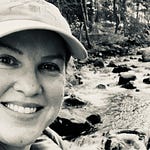
Normally on Fridays we publish bonus interviews with podcast guests, but we don’t have one this week. Instead, I wanted to take this opportunity to share some personal thoughts on the past year and what’s in store for Rethinking Wellness—plus a space to share what you’re looking for in 2024 and how you’re hoping to rethink wellness for yourself this year. The essay is free to read, and the comments are open to paid subscribers. Upgrade to paid to join the conversation.
When my toddler is really struggling with something and verging on a tantrum, she’ll shout “having a hard time!” through her tears. It’s adorable and heartbreaking at once, and it quickly cues us to empathize with whatever she’s going through. “You are having a hard time,” we’ll say, scooping her up for hugs and kisses.
For several months last year, my husband worked late hours and wasn’t home for her bedtime most nights. It was a big change, on the heels of another major shift in her routine (starting daycare), and she started to struggle with going to sleep for the first time since infancy. “Having a hard time,” she’d wail from her crib again and again, looking up at the monitor camera.
During this phase, I took the advice of a popular gentle-parenting expert and started sitting in the room with her until she drifted off, and then every few nights I moved farther away from her crib and eventually out of the room—first in the doorway with the door open, and then finally with it closed.
We went through this cycle for weeks on end. Each time I moved to a farther location, she’d do okay at first, but by the second or third night would devolve into screaming “Mama sit in the chair!” until I relented. Or she’d start acting cute and funny, trying to engage me in play. Or she’d toggle between the two, alternately charming and screaming at me, dragging out the time to fall asleep—30 minutes, 45 minutes, an hour, an hour fifteen. Throughout it all, I tried my best to empathetically set boundaries while feeling increasingly overwhelmed and trapped.
One night, when it took her more than two hours to settle and stabbing pains jolted through my back and butt from sitting on the creaky old floor outside her room, I was forced to admit to myself that this method just wasn’t working. My attempt at helping her was just making things worse.
I realized it was time to try something that had worked for us many times before: giving her some space to figure things out on her own, and trusting her to self-soothe the way I knew she was capable of doing at this stage.
My hunch was correct. After one day of explaining the new routine and one night where she pulled out all the stops to try to get me to stay in the room, she fell asleep on her own. And she’s done it every night since then, with no tears. She now talks to herself happily for a few minutes before nodding off and sleeping through the night, just like she used to.
There have been so many moments over the past year when I’ve been tempted to shout “having a hard time!” in this newsletter. Despite what I’m sure seemed like a calm exterior, in 2023 I often felt like a dysregulated child screaming into the darkness.
Granted, there were some real high points: my second book was published, and it got an amazing response from many people and media outlets I respect. I launched this Substack and got to connect with some incredible people as a result. My daughter learned to walk and talk!
But overall, 2023 was an extremely tough year for me and my family—one of the hardest I can remember. It came to a fittingly shitty end when my husband lost his job a few weeks before the holidays.
The layoff ended up being a blessing in some ways (no more late hours), but many times last year we felt cursed. A lot of people I know did, too, amid the ongoing chaos and brutality in the world and the precarity of the economy. At times I was tempted to process my pain publicly, if only to feel less alone.
But again and again over the years, I’ve come back to the awareness that that’s not actually good for me.
Somewhere I heard the phrase “share scars, not wounds,” and it struck me as profoundly useful guidance for anyone with an online presence. I haven’t always followed that advice—but when I do, I feel immeasurably better.
Everyone is different, but I’ve learned that what works best for my well-being is not to share my personal struggles on the Internet until I’ve spent a long time processing them on my own and with people in my offline life who’ve earned my trust—my partner, close friends and family, my therapist. Airing my troubles as they’re unfolding just leaves me feeling even more tangled up.
In
’s thought-provoking new book, which is about breaking free from all the online and offline influences that have come to rule our lives, there’s an essay called “Vulnerability Clickbait” that really resonates with me.“I am not your clickbait,” she writes. “I am not a live-feed reality show for you to slow-eat-popcorn-gif while you laugh-cry-emoji my life falling apart. And I am not what is, or is not, broadcast onto pixels and screens.”
I interviewed her for the podcast and can’t wait to share that conversation with you in a few weeks (after several other great ones we have in the lineup). In so many ways, that book and my conversation with Jess brought me home to myself and helped me re-anchor in my values.
“I am not what is, or is not, broadcast onto pixels and screens.”
Another thing I got from her, as well as from my work with the brilliant writing coach
, is a reminder of the importance of freedom and space for creative work—and the perils of letting outside voices crowd out that space. In the midst of all the chaos that was my 2023, I could barely hear myself think. I kept taking on more and more people’s opinions as I tried to figure my way out of a stuck spot, and the result was a ratcheting up of the confusion I already felt.It was kind of like how trying to give my daughter more and more and more support to fall asleep just ended up making her struggle more and move further away from her own capacity to do it.
What she really needed was the chance to use the skills she already had.
Of course, this metaphor doesn’t apply to everything.
Sometimes people just need help and can’t rely solely on their own coping skills or offline networks.
Some problems require systemic changes and can’t be solved by getting quiet or looking within.
Sometimes we do need to be held and rocked to sleep, whether we’re 2 years old or 102.
And maybe sometimes we just have to try things for a while to realize they’re not going to work.
For me, though, this idea of coming home to myself and quieting the noise has helped give me some direction for this new year. It’s helped me feel more awake and alive and connected to my work than I have in a long time.
I’m especially excited for some of the things I have in store for this Substack, and I wanted to take a moment to share them with you.
Rethinking Wellness in 2024
First, I’ve decided to double down on this platform. I want to focus my creative energy on this newsletter/podcast instead of on other things I could be doing, like trying to write another book (at least for now). There’s so much I want to explore under the auspices of Rethinking Wellness, and so much more clarity and intention I want to bring to this space. In its first year I was experimenting and investigating what it could be (some might say throwing spaghetti at the wall and seeing what sticks!), but I’m starting to get a better sense of what I want to build and what’s resonating for you.
Here are some of the top pieces from our first year, which represent key themes I want to continue exploring in 2024:
I’m also planning to publish the Rethinking Wellness podcast more frequently this year. I just started working with a new podcast producer, and she’s able to take on some top-level production duties in a way that frees me up to focus more on the content. That means I’ll have more time to research and interview guests and create bonus content for our paid subscribers, and Rethinking Wellness will go weekly starting next month! I’m really excited and have lots of cool things lined up already.
Second, I want to do a better job of connecting the dots. Many of you know me from my first book, Anti-Diet, and my first podcast, Food Psych. When I broadened my lens to address wellness culture, misinformation, and digital well-being (which I’d been exploring over the years on Food Psych, but more as secondary themes), I didn’t spend much time building a clear bridge between this new content and what came before.
I think part of me was nervous to do that, because the more I focused on Rethinking Wellness, the more it started to feel in conflict with my previous anti-diet brands.
But that’s not necessarily true. When I first started my journalism career, I knew a number of people who were skeptics about alternative medicine and also about diet culture and weight science. The two things were not in conflict at all; they stemmed from a common root of critical thinking about science and evidence, and not simply taking conventional wisdom or individual testimonials as gospel. They also both had room for nuance.
Over the years, though, I’ve seen those two forms of skepticism diverge. Some of the skeptics who promote science-based medicine seem to have lost a lot of their skepticism about weight science and the supposed harms of higher body weight. And skeptics of diet culture have in some cases embraced alternative medicine and trumpeted lived experience as being in opposition to—and more important than—science. Both spaces (like most of the internet) have become less nuanced and more polarized.
I think all those shifts have been problematic.
I believe we should be skeptical of both diet and wellness culture, which includes being critical of the conventional wisdom about weight and food. When we actually dig into the science, there are glaring holes in the “higher weight = poor health” and “processed food will kill you” narratives. Wellness skeptics would do well to consider that the diet industry is the second-largest sector of the $5.6 trillion global wellness industry, and it is just as worthy of scrutiny as any other sector.
I believe that personal experience is not necessarily in opposition to science—AND that good science is the best method we have for figuring out whether a given wellness practice has any real benefits beyond placebo effects. The mind-body connection is strong, and there are many ways our minds can help to create genuine healing for the body. We can also mistakenly credit wellness interventions for improvements that would have happened anyway, thanks to our bodies’ own healing processes and the natural ebb and flow of symptoms. Well-conducted studies can help tease these things apart and give us valuable perspective that we can’t get from “n=1” self-experiments.
And I believe, based on both my personal experience navigating chronic illnesses and my professional experience delving deeply into scientific research over the past 10+ years (both of which are my “lived” experiences), that alternative medicine often does more harm than good. The conventional healthcare system certainly has its own problems, and when we feel dismissed and uncared for by doctors it’s only natural to seek out alternatives that purport to get to the “root cause” and treat us as whole people. It’s important to trust our intuition and keep searching for help when something just doesn’t feel right, and to find compassionate providers who make us feel heard. But in my view, alternative, integrative, and functional medicine often just muddy the waters even more, wasting people’s time and money and creating a whole host of new problems—including disordered eating.
I hope that going forward I can articulate these ideas more deeply, and in the process help bridge the gaps between these two necessary forms of skepticism.
At the same time, there are some topics I’ve covered in the past that don’t feel like a natural fit here anymore—particularly the content focused specifically on disordered-eating recovery. And yet that subject is still very much a part of my work and expertise, so I’ve been thinking about how to give it a proper home.
That’s why starting soon, in addition to the Rethinking Wellness podcast and newsletter, I’ll be bringing back Food Psych for a limited run of content devoted to helping people heal from disordered eating. I’m still working out the schedule and the details, but I’d love for you to subscribe wherever you listen to podcasts so that you get new episodes delivered whenever they drop!
Finally: social media. If you’ve been reading or listening to my work here at all, you know I have an ambivalent relationship with social platforms and spend little to no time on them anymore. I stay away primarily for my own mental health, but I also realize there are people who value (or would value) my work and perspective and may never find me if I don’t show up on social occasionally. Though I’ve often thought about getting off the platforms for good, I’m not in a position where I can do that yet.
Last year, my solution to maintaining a social-media presence was to randomly send my husband things to post on my behalf sometimes, but I knew that wasn’t sustainable. Then, recently, I got the opportunity to work with a social-media manager—a longtime listener of mine who truly gets my work and has devoted her entire career to content strategy. She’s already done a great job sharing things I never would’ve gotten around to, and I’m excited to see how her support helps grow this space in the months to come!
Those are some of my goals for 2024, but I’d also love to hear from you what you’re looking for from Rethinking Wellness and how my work can best serve you.
What content do you want to see more of here?
What would you like to see less of?
What piece(s) have you liked best?
You can leave a comment if you’re a paid subscriber, or hit reply to share your thoughts. We’ll do a more formal audience survey later in the year, but I’d love to take any suggestions you have into consideration now, as I plan for the new year.
Speaking of your input: thanks so much to everyone who voted in the poll a few weeks ago about transcript editing. The results are in, and most people said the transcripts are fine as they are, but a substantial minority said that they’d be more likely to read them if they were edited. As it happens, my new podcast-production team does transcript cleanup for a much more modest fee than other editing services I looked at, so I’m happy to report that we’ll be offering this starting soon!
And now, for paid subscribers, I want to open up the comments to discuss not just what you want from me/Rethinking Wellness in 2024, but also other things you’re working toward this year related to (lowercase) rethinking wellness. That might include healing your relationship with your body, finding a new doctor, cultivating more space for creativity, ditching an expensive supplement regimen, taking a step back from social media, letting go of wellness-diet rules, questioning popular trends, etc.
Feel free to share in whatever way feels good to you (or not—see above re: digital boundaries!), and use this space to connect with others in a similar place. We’re NOT here to talk about weight-loss goals; this is about getting out from under the influence of wellness and diet culture, so that you can live a bigger, richer, more fulfilling life.
If you’d like to comment, please follow a few ground rules to help keep this a supportive space:
Avoid promoting specific diets or wellness practices, and don’t go into too much detail about the wellness-y things you’ve tried (even if you’re now critical of them). Those details can serve as unintentional how-to manuals for others who are struggling.
Avoid weight and calorie numbers and any other weight-stigmatizing or food-stigmatizing language.
Don’t give health/wellness advice or try to diagnose anyone. This thread is not medical advice (or mental-health advice, nutrition advice, financial advice, etc. etc.).
Don’t use this space to sell/promote anything.
Above all, please be kind to each other and thoughtful in what you post.
Thanks for reading, and I’ll look forward to seeing your responses in the comments!
















